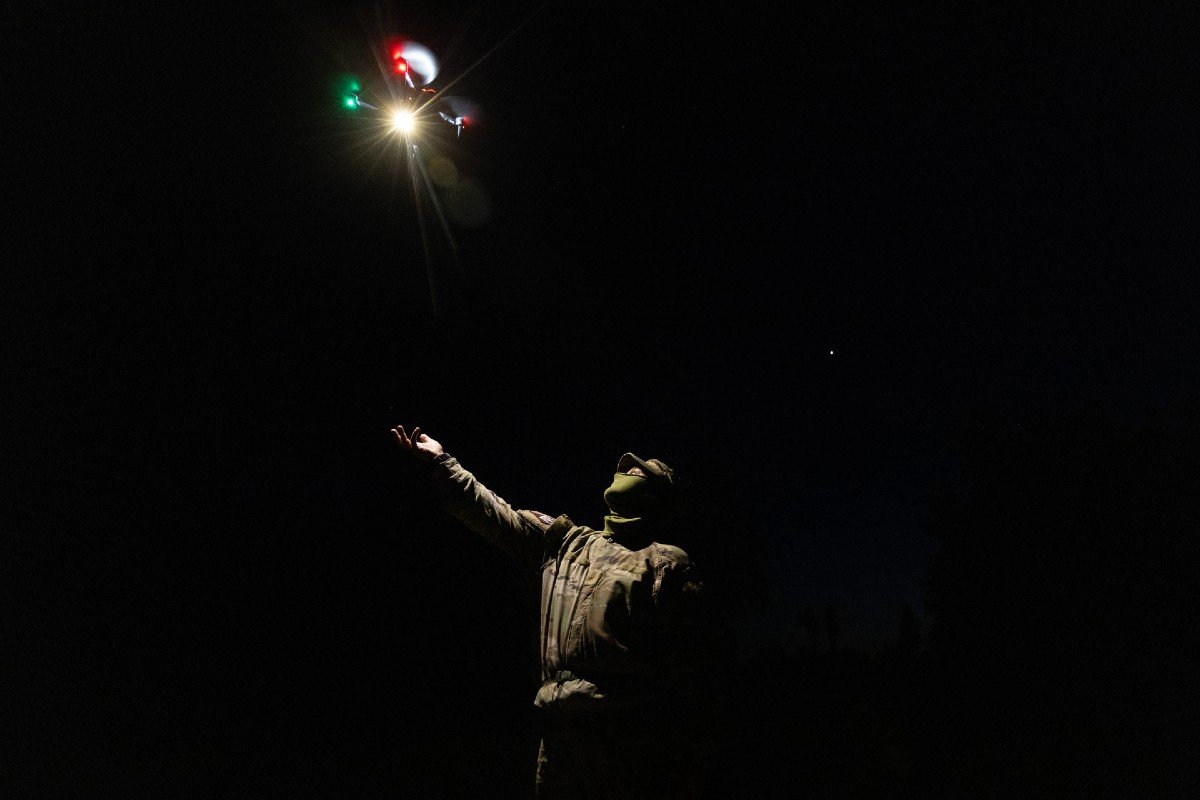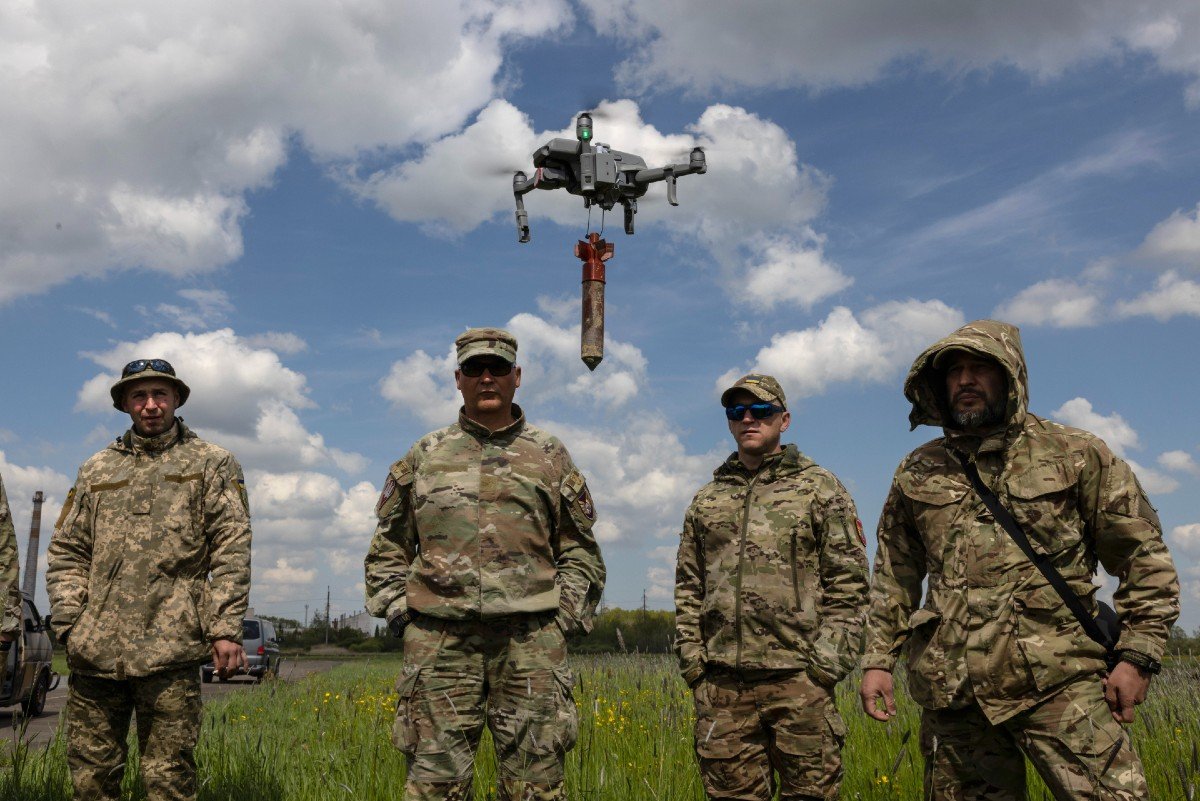Ukraine Ramps Up Drone War With Russia
As Russia pours resources into deploying more and more uncrewed vehicles in Ukraine, Kyiv has no intention of conceding its long-running lead in the bitter drone-war, which is fast approaching the 2-year mark.
Ukraine is keeping a close eye on Russia’s advances in drone development, and the significant resources it is dedicating to unmanned vehicles, Mykhailo Fedorov, Kyiv’s minister of digital transformation, who is at the helm of the drone efforts against Moscow, told Newsweek.
Kyiv has a multi-pronged approach. It is acquiring tens of thousands of first-person-view (FPV) drones, developing interceptor drones, expanding its protection against Russian loitering munitions and upping domestic UAV (unmanned aerial vehicle) production.
“The front line situation depends on drones,” Fedorov said. “This is a 24/7 war.”
Kyiv has run a series of fundraisers to finance its grand drone plans, including the two “Operation Unity” bids launched by the United24 platform, the Ukraine-based Come Back Alive Foundation and Monobank. The initial fundraiser collected around $6.3 million in August to buy 10,000 first-person-view attack drones, many of which are already on the front lines.
A second round of fundraising for Operation Unity earlier this month took just three days to raise enough money for 5,000 more FPV drones. An estimated 224,059 donors from Ukraine and 59 other countries contributed to the drive “for a New Year’s fireworks show for Ukraine’s enemies,” United24 said.

Paula Bronstein/Getty Images
The funds will buy 3,000 FPV drones kitted out with thermal cameras, plus 2,000 more with daytime cameras, with a range up to 22 kilometers, or just over 13 miles. An initial batch of 3,000 drones will arrive in Ukraine shortly after the new year, with a second batch following in February 2024.
Kyiv has also launched a separate fundraiser to shield the country’s cities and infrastructure from Russia’s notorious Shahed kamikaze drones.
Russia’s investment in drones
This is all done with the knowledge that Russia is trying to catch up with Ukraine’s initial dominance with UAVs.
Moscow has certain drone types which Ukraine doesn’t have yet, Fedorov told Newsweek, adding, “They have more money” to funnel into development and production of high numbers of drones.
“It’s hard to compete with Russia on quantity,” he added, although Ukraine picks apart what is going well—and not so well—with the drone war “on a daily basis.” Much depends on how quickly Kyiv can implement design changes to its battlefield drones, he said.
Russia has “significantly ramped up” its production of FPV drones, like those bought by Ukraine through its fundraisers, Samuel Bendett of the Center for Naval Analyses, a U.S. think tank, previously told Newsweek. “It’s highly likely that these efforts combined are providing the Russian military with tens of thousands of FPVs a month,” Bendett evaluated.
This is what Ukraine is now up against, heading into the new year. It is currently burning through tens of thousands of drones each month, Fedorov said, although he declined to provide further details about how many Kyiv loses.
Battling Shaheds
Another part of Russia’s drone campaign has been upgrading its infamous, Iranian-designed Shahed kamikaze drones.
Moscow has deployed its Shahed drones throughout the war in Ukraine. Also known as Geran drones, they are known for their distinctive, low, buzzing sound, and are capable of carrying a warhead that shatters or explodes when it reaches the intended target. Once spotted, they are often relatively easy for Ukraine to shoot down, but detecting them is often the biggest challenge.
However, Ukrainian military officials said in late November that Russia had started sending modified versions of the Shaheds over Ukrainian territory. The new versions were darker and made of carbon fiber, making them harder for Ukrainian air defenses to pick up.
As winter drew in, Ukraine’s military reported increased numbers of overnight Shahed drone strikes, as Western analysts had anticipated. Early on Sunday, Kyiv’s military said Russia had launched 15 Shahed drones from southern Russia.
Ukrainian air defenses shot down 14 of the UAVs over the south, center and west of the country, Kyiv said, but reported overnight barrages of up to 75 Shaheds in a single evening. It said on Thursday that Moscow had launched a total of 3,700 Shahed attack drones in the 22 months of all-out war.
Kyiv is “developing anti-Shahed solutions,” Fedorov said, adding it was focusing on identifying incoming Shahed drones, while developing and producing its own long-range drones.
“In terms of production, we do a lot compared to last year,” he said.

Paula Bronstein/Getty Images
Interceptor Drones
Ukraine has been quietly investing in interceptor drones, ones designed to take out enemy UAVs in mid-air. Kyiv has been deep in research and development for this type of hardware for around a year, Fedorov said.
Tests on interceptor drone technology inside Ukraine often shows signs of success, but there is a lot of scope for improvement, he added.
However, the minister remained tight-lipped on other details around Kyiv’s interceptor drone program, commenting only that Ukraine is scaling up its domestic production of UAVs and restocking its constantly depleting arsenal to counter Russia’s deeper pockets.
Uncommon Knowledge
Newsweek is committed to challenging conventional wisdom and finding connections in the search for common ground.
Newsweek is committed to challenging conventional wisdom and finding connections in the search for common ground.

Comments are closed.